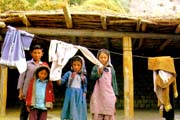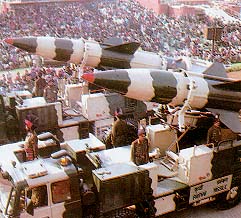Commentary/Dilip D'Souza
Illiterate and Unhealthy, but Secure!
I had a fascinating evening with a stockbroker friend some months
 ago. He spent most of it explaining his job to me. As he rattled off a
string of acronyms -- FII, NAV, NSE, MAT, NABARD and possibly some more;
I have no idea what they mean, so don't ask -- I drifted off into other
thoughts. It occurred to me that there can't have been too many times in my
life when so few -- meaning me -- understood so little of so much. Apart from
my college years, of course. And apologies for mangling Winston Churchill.
ago. He spent most of it explaining his job to me. As he rattled off a
string of acronyms -- FII, NAV, NSE, MAT, NABARD and possibly some more;
I have no idea what they mean, so don't ask -- I drifted off into other
thoughts. It occurred to me that there can't have been too many times in my
life when so few -- meaning me -- understood so little of so much. Apart from
my college years, of course. And apologies for mangling Winston Churchill.
Some of the feeling I had that evening comes back when I read
page after page -- often filled with the same acronyms -- of Budget analysis
in the papers. Some of it, probably most, goes entirely over my head.
But I pore over the reports anyway, hoping hard that I will get an idea of
what the Budget will mean to me, to the country.
So it was this year, with P Chidambaram's first Budget. I feel
distinctly unqualified to make learned comments on it, so I will not. But
I am struck this year, as I am every year, by a few things in the Budget.
Almost everything about the Budget attracts two or more opinions.
If one school of thought reacted by claiming the Budget tries to 'raise
revenues without putting any burden on the poor,' another says it
is designed to 'finally destroy the poor.' If a politician dismisses
it because it 'only talks of the business community and not the poorer sections of
society,' a stockbroker dismisses it because there is nothing in it to 'bring
cheer to the investor community.'
Of course, every Budget is greeted with contrary opinions like
these.
But there is one aspect of the whole exercise, one area of proposed
government spending in the Budget, on which all shades of opinion
invariably come together. The disagreements, if any, are minor
and are usually about the rupee amounts involved. Yes, when it's defence
the Budget addresses, everyone agrees that not one phony paisa will be spared
to ensure the 'security of the nation.'
P Chidambaram is
no exception. He even told Parliament that additional funds from outside the Budget
will be made available, if necessary, to 'keep our armed forces in fighting
fit condition.' Which was a promise his prime minister echoed.
 The only carping about defence came from some people who always
demand that even more must be spent on it than the Budget already allocates.
Some of these men also profess to be great nationalists. You see, to be
a true nationalist, you have to demand ever more money for defence. You
didn't know that? Shame on you!
The only carping about defence came from some people who always
demand that even more must be spent on it than the Budget already allocates.
Some of these men also profess to be great nationalists. You see, to be
a true nationalist, you have to demand ever more money for defence. You
didn't know that? Shame on you!
Be that as it may, what is the amount Chidambaram has earmarked
for defence in his Budget? Rs 277.98 billion. That's an increase of Rs 9.19
billion over last year. That's also a full 12% of government expenditure
planned over the next year. That's what the security of the country is
going to cost us in India.
Now there's little sense in bland figures like these, unless we
put them in some perspective, or compare them to other budgetary plans. So
think of the defence budget in this way: every single citizen of this gigantic
country -- poor or rich, Bihari or Tamil, pager-toting stockbroker in
Bombay or spear-toting Saora tribal in Orissa -- every single Indian will
spend Rs 300 on defence next year. Now that's the price of security.
Compare it to what the Budget sets aside for spending on health.
That figure is Rs 7.92 billion: itself a commendable Rs 1.45 billion
increase over last year. There's also Rs 44.8 billion that Chidambaram
plans to spend on education, Rs 15 billion more than last year. Though
I should point out that much of that increase will pay for a midday meal
scheme for primary school children. And while primary education gets at least
this boost in the Budget, secondary and higher education will have
to cope with lower amounts to spend.
But whatever the breakup, chew on this a while: while every Thampy,
Jikku and Hari in India will pay Rs 300 for our 'security'
next year, each of them will also pay less than Rs 9 towards the health of our citizens.
Less than Rs 50 each on education.
Defence eats up over five times as much as health and education spending
combined. Nobody thinks this is in the least unusual. In fact,
as I said earlier, the only dissenting voices about defence spending belong
to those who think it should be even higher than it is.
The Navy has not
added 'a single big ship since 1988,' a rear admiral worries. Atal
Behari Vajpayee of the BJP pronounces that Chidambaram and his government are
'not paying adequate attention to the defence sector.' Jaswant Singh,
also of the BJP and finance minister himself for 13 days recently, thinks
defence should have been allotted more than Rs 300 billion.
Not one of these people has anything to say about education and
health expenditures.
The results of years of these skewed priorities are around us
for all to see. Closing in on the 21st century, every second Indian cannot
read and write, the largest such pool of wasted talent in the world. Half
the primary schools in the country have no blackboard. Three of every
five have just one teacher -- most of those teachers never come to teach
anyway -- and four of every five don't even have a toilet.
Millions of Indians
have no access to health care of any kind. There are primary health
centres across the nation which have no doctors and no medicines. We will
soon have the world's largest collection of AIDS patients. We are 135th
in the world in the Human Development Index. Fully 79 of every 1,000 Indian
infants die before they are a year old: compare that to 31 in China, 40 in
the Philippines and 5 in Sweden.
I could go on and on, because dismal realities like these are
easy to find in this vast country. What's just as real is that India possesses
arms of every possible description: planes, guns, tanks, bombs, missiles.
Yes, ships too, even if there hasn't been a single big ship added to
the navy in eight years (and so what? I'd like to know). We are one of the world's
poorest countries, but one of its biggest buyers of arms.
Why? Because we are simply obsessed with the security of the country.
The lives of our people, on the other hand, merit no such obsession.
It seems to me that we need an entirely new definition of security.
It's all right to ensure that our borders are secure, that we can defend
ourselves adequately in any war. But what's the meaning of such
security
if, within our borders, the majority of us must live desperate
lives? What are we protecting? What's the security for?
Here's the question I wish someone would answer: isn't it time
national security and national integration, these phrases that are so easily
bandied about, were measured in terms of the security and integrity of
Indian lives?
For the greatest protection of all, the surest guarantee of a
strong and secure India, is not our army or navy or fancy planes and guns.
Instead, it lies in the prosperity and health of our people. All our people.
When we give all Indians an education, when they all have access to reasonable
health facilities, we will have set ourselves firmly on the path
to being united and secure. There are not enough arms on the planet to
give us that.
Unfortunately, we have not understood this. Even though there
are no obscure acronyms to puzzle over.
|





 ago. He spent most of it explaining his job to me. As he rattled off a
string of acronyms -- FII, NAV, NSE, MAT, NABARD and possibly some more;
I have no idea what they mean, so don't ask -- I drifted off into other
thoughts. It occurred to me that there can't have been too many times in my
life when so few -- meaning me -- understood so little of so much. Apart from
my college years, of course. And apologies for mangling Winston Churchill.
ago. He spent most of it explaining his job to me. As he rattled off a
string of acronyms -- FII, NAV, NSE, MAT, NABARD and possibly some more;
I have no idea what they mean, so don't ask -- I drifted off into other
thoughts. It occurred to me that there can't have been too many times in my
life when so few -- meaning me -- understood so little of so much. Apart from
my college years, of course. And apologies for mangling Winston Churchill.
 The only carping about defence came from some people who always
demand that even more must be spent on it than the Budget already allocates.
Some of these men also profess to be great nationalists. You see, to be
a true nationalist, you have to demand ever more money for defence. You
didn't know that? Shame on you!
The only carping about defence came from some people who always
demand that even more must be spent on it than the Budget already allocates.
Some of these men also profess to be great nationalists. You see, to be
a true nationalist, you have to demand ever more money for defence. You
didn't know that? Shame on you!